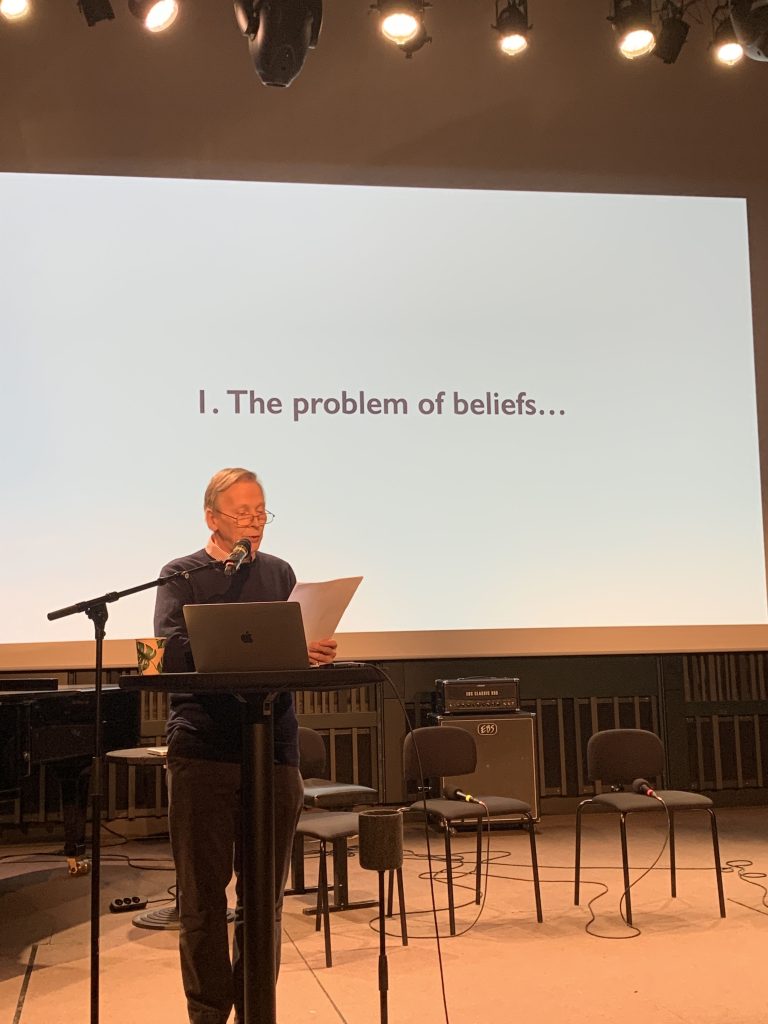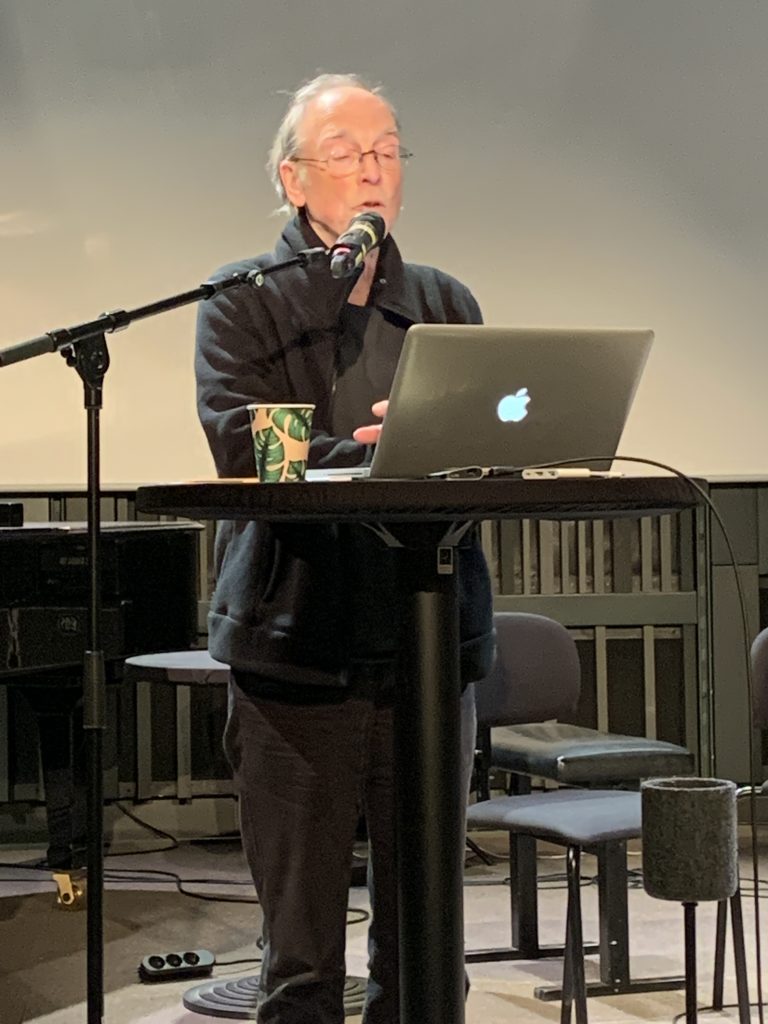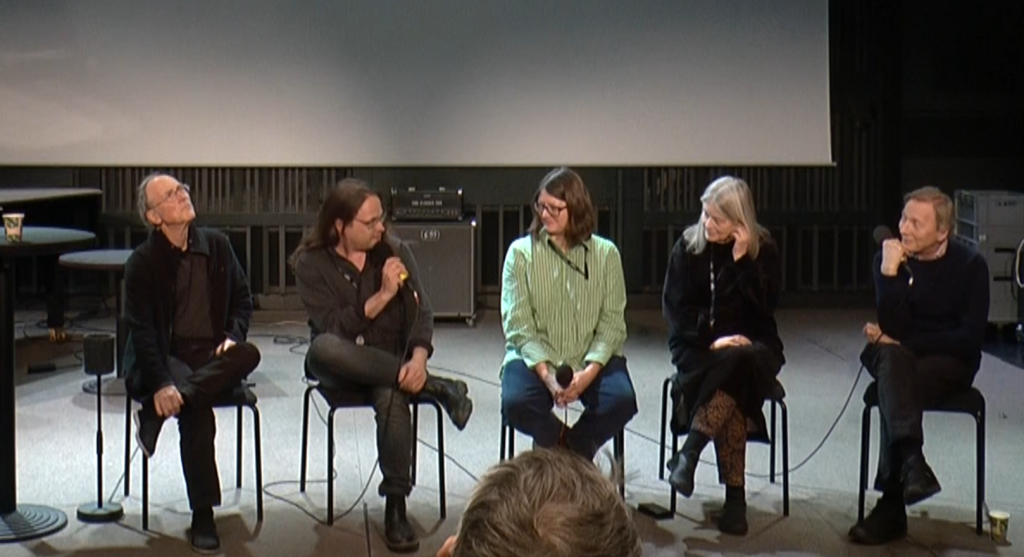The BTTF Symposium
On March 28-29 2023 we had some special guests take part in a public symposium at the Royal College of Music in Stockholm to give their perspectives on the things we were researching. Aside from the four of us, those taking apart were professor emeritus Daniel Leech-Wilkinson; the musician and researcher Chris Cutler; the professor emeritus and violinist Anna Lindal; and professor and guitarist Stefan Östersjö. The moderator for the panel discussion on the first day was Sara Norling.
The following sections contain quick summaries of some of the subjects broached during these sessions.

Daniel Leech-Wilkinson “What must a performance achieve?”
Leech-Wilkinson made a presentation based on some ideas espoused in his important online book and resource, ”Challenging Performance”, which we heartily recommend to anyone who has ever wondered about why classical performances sound way they do. His presentation focused on three main points:
”First, classical music performances are unnecessarily constrained by a set of false beliefs about the job of the performer. And therefore, performances could and should be much more varied. Second point, this raises the question of what a performer must achieve, if not following the old rules. And third, I want to suggest that classical music should use its new freedoms to do critical and social work that improves lives. The problem rests on the belief that composers create works with a capital W, which performers sound and listeners receive. All thinking about this music, whether by practitioners, the wider music business or in academia, by philosophers, sociologists, all musicologists, all of it rests its arguments upon that core belief, simply taken for granted. Yet it’s evidently not true. Music happens, it doesn’t exist, it’s an experience over time. As is everything else in life. And that is why I think it makes better sense to think of everything that we experience in the world as essentially musical than to think of music as some kind of thing, an object, that exists.”

Chris Cutler: “Whose music: interpretation and memory”
Adapted from among other things his two best-known books, ”File Under Popular” and ”Not as We Choose”, Chris spoke at length about the question (and problem) of memory and recording in shaping the kinds of music that we perform.
”…….In all musical cultures mediated by biological memory, it is precisely through this process of selective re-creation that songs and stories evolve in ways that keep them relevant to their changing contexts. In such cultures the problematics we are addressing here don’t meaningfully arise.It is only with the invention of writing – an objective and permanent form of memory – that cracks begin to appear. Writing isn’t subjective, it’s objective – and it never forgets; with writing an original text is fixed in place and, if there’s ever any doubt about it, you can go back to it and check.And while biological memory is mediated by the ear, writing addresses the eye. A score is an aligned grid on which melody runs horizontally, harmony vertically; and rhythm is measured out in quantised fractions. Polyphony, harmonic modulation and the calculated use of retrogrades and inversions are all visual, not aural innovations. And music, once it is mediated by writing, proceeds less from the feel of an instrument or the sound of a space than it does from the calculated manipulation of marks on paper …Naturally, we don’t want to lose or discard the extraordinary body of music that constitutes our history, but it is history; and while it still speaks to us, it doesn’t speak of our own times. I don’t disagree that it’s essential to preserve these works as waystones and monuments – but it will add positively to the musical commons if we can also find other, more contemporary, lives for them, because, as it is with scripture for the non-religious, once a sacred text has been decoupled from the machineries of power, it can become free to find new ways of meaning in a secular literary world, meanings that include and recontextualize its past, rather than trying passively to reproduce it.

Panel discussion 1, ”Why so angry?”
From left: Chris Cutler, Stefan Östersjö, Sara Norling, Anna Lindal, Daniel Leech-Wilkinson
Here we discussed some of the reasons which might lie behind the anger directed at attempts o perform classical music in new ways. We began by speaking about the intensely personal relationship many have with what they feel is a work of music: DLW ”They become you, you become them. Or if there’s still some distance, if it’s like the pieces are your lover, you have such an intimate relationship with them, that if somebody comes along and plays that music differently, it’s like they’ve supplanted that loving karma.” GK: ”This works both ways: when me and Mattias play the four seasons, there are many composers who thought they hated the work, but after hearing it in a new version they went back to older recordings and found them better than they first thought.” Also important is the role of education. A musician must spend so much time learning to play in a certain way, they become protective of those playing styles so as to justify the time spent learning them. DLW: ”the rhetoric of ”composers intentions” is equally characteristic of mainstream performance, which has the curious consequence that nobody is in greater denial or the creativity of performance than of performers.”
So the reasons are many: conservatism, comfort, status quo, we want to have something that’s a constant in our lives and classical music can fill that role.
The example of theater was used in comparison with the opposition to new practices with music:
RN: Updating language, cutting, making changes, that’s just a natural way of working with for example Shakespeare classics, even on the big stages. Why isn’t that happening in the music world?
DLW: ”I think it’s such an important analogy with theatre where all these things are perfectly normal, in fact essential. Every time you perform a text you’re trying to find new meaning in it, which is exactly the opposite from in music. There’s nothing inherent in music that prevents it from being treated like that, it’s entirely tradition. And I’ve got a wonderful example: it’s an acting exercise in which an actor says ’would you like a cup of tea’ in, I think, something like 24 different ways in one minute. And that’s just a basic training exercise. Now why don’t we teach classical musicians as children to play, and in 24 different ways. We don’t, we try to teach them to play it one way, the right way. And so the problems do start there.”
CC: I thought, this is also about power and hierarchies, role of the composer and the performer, and I think it would be fantastic if we change.
We agreed that part of the solution is our evolving towards a point in historical time where the interpreter becomes more equal with the composer.
Stefan Östersjö, ”Negotiating voice with dead and living composers (and performers)”
Using a project in which the music of a fictitious female blues guitarist is unearthed and performed, Stefan delved into the problems of expectations and negotiations in music, whether the composers are alive or deceased.
Anna Lindal, ”Poetics of Unlearning”
Anna spoke about different aspects of artistic research from her personal experience, from the viewpoint of failing and forgetting through a violinists rootedness in the instrument itself, the Baroque violin, close work with new music composers, and free improvisation. Her own journey of practically challenging what she has learned and internalized was an important part of the presentation.
“Interpretation, Transcription, Arrangement, Recomposition, Music: What do we call it?”Panel discussion 2
One of the primary problems faced by alternative interpretation are the expectations surrounding a concert and a work. GK:
”we talked a lot about yesterday about the problems with trying to change habits and change the way people think about what music is. And one of the things that I think is central to this whole problem set is what we to call it. I mean, the nomenclature of what’s a concert and what’s classical music, or music, or new music, because expectations are at least half of what you have to play around with when you get people to go to a concert. We have to get them to the concert first, right?”
GK: We talked about museums a lot. And I guess that’s the accepted way of presenting music. And it is important: if I hadn’t heard Beethoven’s violin concerto in a totally normal setting with a good violinist when I was 14 I wouldn’t have become a violinist. But are concerts only museums? And if we use Beethoven or Bach or whoever as a basis, does that create the wrong expectations so people feel unsure about what they are hearing? Do we need to explain it better?
DLW: If somebody says, I’m doing Beethoven, and then you sit there and you hear nothing about Beethoven, you will feel lied to, if it hasn’t been explained to you in advance, in how far it’s gone. So, what I’m saying is I don’t think people will bring those expectations automatically.
EMP: ” To me, there’s really no point in playing that, unless you play with the expectations of that old music piece. Because, I mean, to be blunt, what’s the point of playing old music?”
GK: But we don’t have a term for, if there are two kinds of audiences, one of them is happiest when they find out exactly what they already know. And the other is happiest when they find out there’s something more than that they already know out there. And maybe that’s the two primary sorts of groups that could conceivably think of going to a concert. Maybe that’s the inclination you have to sort of make no matter what music you’re playing. And so we have to be communicating that this is a ”secular” concert. And this is a ”religious” concert. Or something like that.
CC: ”The tradition also has limits. It’s like poetry. If you innovate in poetry, you have to stay within the recognized form, or otherwise you’re writing nonsense. You have to move your steps one small step at a time, so that you can still see where you’ve come from. And then you can see by contrast what’s been changed. That’s how you innovate in a tradition. If you go beyond that, so that you can’t look to see where you’ve come from anymore, then you actually are on a different ground, then you’re not and can’t claim that you’re in a tradition anymore. So you’ve broken the tradition. Which is not a bad thing. Just different.”
MP: One reason of doing this project, I think, that is for me, is to question people that have a clear idea of what music is. That, like, going to a piano recital would not necessarily mean the traditional, the traditional piano recital. That’s one of the reasons. It might not be actually about interpretation. I hate that division between composition and interpretation. I’m a composer, performer, I do stuff that I sound, and sometimes people hear it as music.
GK: And sometimes I’m forced to write notes occasionally. And then I say that I just made a thing, not a piece. I don’t make the note decisions. Well, sometimes, but I can’t call myself a composer.
MP: Composing a program, I could say okay, so what’s a composer and what’s an interpreter? I can’t say. A composer interprets the idea too.
Perhaps we are too worried about what it should be called. Maybe the only thing that matters is the performance itself?
